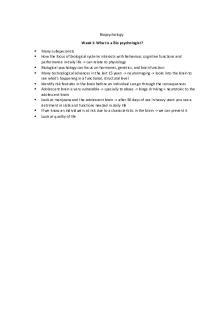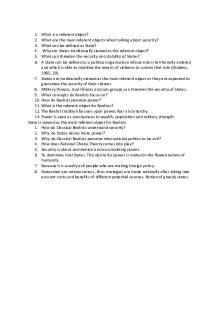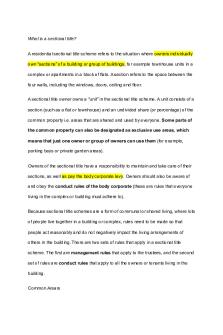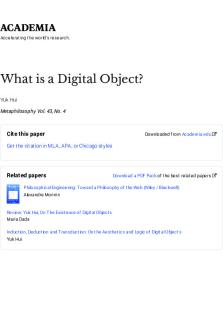Tutorial 1 UK CON - what is a constitution PDF

| Title | Tutorial 1 UK CON - what is a constitution |
|---|---|
| Course | UK constitutional law |
| Institution | University of Aberdeen |
| Pages | 4 |
| File Size | 143.9 KB |
| File Type | |
| Total Downloads | 40 |
| Total Views | 125 |
Summary
what is a constitution ...
Description
TUTORIAL 1 The Nature, Sources and Institutions of the UK Constitution Overview This tutorial will cover material covered in Lectures 1-5. This tutorial will consider the meaning and functions of a constitution. It will focus in particular on the debate over whether the UK constitution can be said to possess a constitution, its nature and sources. The UK Parliament, its powers and functions, will also be discussed. Consider the questions below in light of the reading and come to the tutorial prepared to discuss them. Reading
Stanton and Prescott, Public Law: reading for Lectures 1-5 above F.F. Ridley, ‘There is no British constitution: a dangerous case of the Emperor's clothes' (1988) 41(3) Parliamentary Affairs 340 (available online via Aberdeen University institutional login) N.W. Barber, ‘Against a written constitution’ (2008) Public Law 11 (available online via Aberdeen University institutional login)
1. How does the UK constitution differ from the majority of other constitutions?
WHAT IS A CONSTITUTION? = SET OF PRINCIPLES AND RULES FOR SOCIETY – RULES OF P AND GOV – INSTUTIONS OF STATE – RELATIONSHIP WITH ONE ANOTHER – HOW THEY TREAT EACH OTHER
o o o o o o
2.
“the term British constitution is near meaningless” Arguably is not set in stone depending on which definition of C that you look at – functional or in the narrow sense Our C is: uncodified (only partly written) unentrenched – flexible laws it’s evolutionary and modifies to times (new C rules impose limits on authority of existing institutions) there is uncertainty as to what is/ is not part of the C: But no C is ever fully written!
What are the sources of the UK Constitution? o o o o o o o
International law – EU LAW Legislation Judge made law – COMMON LAW Royal prerogative – LEGAL POWER OF THE CROWN Works of authority (non-legal) – ACADEMIC WORK – DICEY Conventions (non-legal) – POLITICAL RULES PARLIAMENT – MAKE RULES FOR THEMSELVES
3. What are constitutional conventions and how significant a role do they play under the constitution? o
(royal assent)
o o o o o o o
Non-legal but politically binding rues of C nature Generally unwritten but can be codified Acting contract to these conventions is unconstitutional but not illegal Courts cannot enforce conventions but can recognise them – persuasive Not unique to the British C Normally stems from precedent rule – used if feel obliged to follow if there is good reason to do so. Conventions often impose limits on the legal powers of the monarch – ROYAL ASSENT
EXAMPLES OF CONVENTIONS:
Monarch: I. Royal assent to legislation II. The appointment of PM Executive: I. PM must belong to the HOC II. Government responsible to Parliament Parliament: I. Parliament will not legislate on devolved matters II. Parliament must meet once per year – LESS RELEVANT NOW – USEFUL WHEN MONARCHS COULD RULE FOR 11 YRS ETC WITHOUT CONVENTIONS WOULDN’T HAVE DEMOCRATIC SOCIETY WE HAVE TODAY CAN’T ENFORCE CONVENTIONS IN COURTS 4.
Read the articles by Ridley and Barber above.
What are the advantages and disadvantages of the UK Constitution? Advantages o Easily adaptable- an uncodified constitution can be amended smoothly and quickly when needed. o Evolution- has evolved and adapted over time therefore is not outdated or ambiguous. o Strong government- UK constitution provides a clear sovereign decision-making authority, also the core executive is established. o Accountability- Strong gov = responsible gov. Government is accountable to parliament which is accountable to the citizens. Disadvantages o Lack of Clarity - not always clear when government has acted unconstitutionally. i.e conventions on ministerial responsibility are unclear. There is no constitutional court to check the power of the state and defend civil liberties. o concentration of power - power is dangerously at the centre. Few safeguards against the arbitrary exercise of state power. strong majority governments can force through legislation without much dispute. o Undemocratic? - Conventions are outdated and unclear, notably the royal prerogative. House of Lords also present a lack of democracy. 2
Do you believe it should be more like other constitutions? The UK constitution has strength in its adaptability and traditional status. However, it fails to provide clarity and ease when it comes down to determining whether an act is unconstitutional or breeches human rights. Could be more codified to solve this problem.
5.What does the term ‘Queen-in-Parliament’ refer to? o o o
The Monarch The HOL The HOC = All in parliament THE QUEENS ROLE IN LEGISLATIVE PROCESS
6.Under what circumstances may legislation be passed without the consent of the House of Lords? Do you believe bypassing the House of Lords in this way is justifiable? o
The powers of the House of Lords are limited by a combination of law and convention. The Parliament Acts, although rarely used, provide a way of solving disagreement between the Commons and the Lords.
o
Parliament Act 1911:
o
The result was the Parliament Act 1911, which removed from the House of Lords the power to veto a Bill, except one to extend the lifetime of a Parliament. Instead, the Lords could delay a Bill by up to two years. The Act also reduced the maximum lifespan of a Parliament from seven years to five years.
o
Parliament Act 1949:
o
The Parliament Act 1949 further reduced the Lords' delaying powers to one year.
o
The Parliament Acts define the powers of the Lords in relation to Public Bills as follows.
o
Money Bills Money Bills (Bills designed to raise money through taxes or spend public money) start in the Commons and must receive Royal Assent no later than a month after being introduced in the Lords, even if the Lords has not passed them. The Lords cannot amend Money Bills.
o
Other Commons Bills: Most other Commons Bills can be held up by the Lords if they disagree with them for about a year but ultimately the elected House of Commons can reintroduce them in the following session and pass them without the consent of the Lords.
Bound by Salisbury- Addison convention: the HOL must not strike down any manifesto bill @ a second reading o Or introduce ‘wrecking amendments’ o
7.Explain the meaning and scope of ‘parliamentary privilege’. 3
Do you think the doctrine is still needed?
o o o o o o o o
I.
II.
A collection of rights and immunities to P and it’s members Not codified or recorded in statute It’s objective (to protect P from other branches of the government) Protects debates, committees, votes and hearings Vital to the C order – ‘strengthens the democracy’ Applies to all houses P cannot bind its successors No court has power to invalidate an act of P
Freedom of speech Protection for P proceedings Executive cognizance The right of each house to recognize its own proceedings w/o interference by the courts Right to determine its own rules and procedures Rule has been relaxed by courts: Pepper v hart: source ambiguities R v Chaytor: worked w police – renounced any right to use PS Sometimes it’s used for the best of the public interest – scandal cases Can be seen as unneeded as it protects acts that otherwise would be criminal – unjust/unfair
4...
Similar Free PDFs

Tutorial 1- what is mooting
- 3 Pages

Uk constitution essay
- 3 Pages

What is a Biopsychologist
- 1 Pages

1-1 Discussion What Is a Myth
- 2 Pages

What is a referent object
- 1 Pages

What is a social fact
- 2 Pages

What is ABA - Grade: A
- 5 Pages

What is race - Grade: A
- 1 Pages

What is a sectional title
- 4 Pages

What is a summary judgement
- 5 Pages

What is a product - lecture
- 4 Pages

What is a Digital Object?
- 17 Pages
Popular Institutions
- Tinajero National High School - Annex
- Politeknik Caltex Riau
- Yokohama City University
- SGT University
- University of Al-Qadisiyah
- Divine Word College of Vigan
- Techniek College Rotterdam
- Universidade de Santiago
- Universiti Teknologi MARA Cawangan Johor Kampus Pasir Gudang
- Poltekkes Kemenkes Yogyakarta
- Baguio City National High School
- Colegio san marcos
- preparatoria uno
- Centro de Bachillerato Tecnológico Industrial y de Servicios No. 107
- Dalian Maritime University
- Quang Trung Secondary School
- Colegio Tecnológico en Informática
- Corporación Regional de Educación Superior
- Grupo CEDVA
- Dar Al Uloom University
- Centro de Estudios Preuniversitarios de la Universidad Nacional de Ingeniería
- 上智大学
- Aakash International School, Nuna Majara
- San Felipe Neri Catholic School
- Kang Chiao International School - New Taipei City
- Misamis Occidental National High School
- Institución Educativa Escuela Normal Juan Ladrilleros
- Kolehiyo ng Pantukan
- Batanes State College
- Instituto Continental
- Sekolah Menengah Kejuruan Kesehatan Kaltara (Tarakan)
- Colegio de La Inmaculada Concepcion - Cebu



